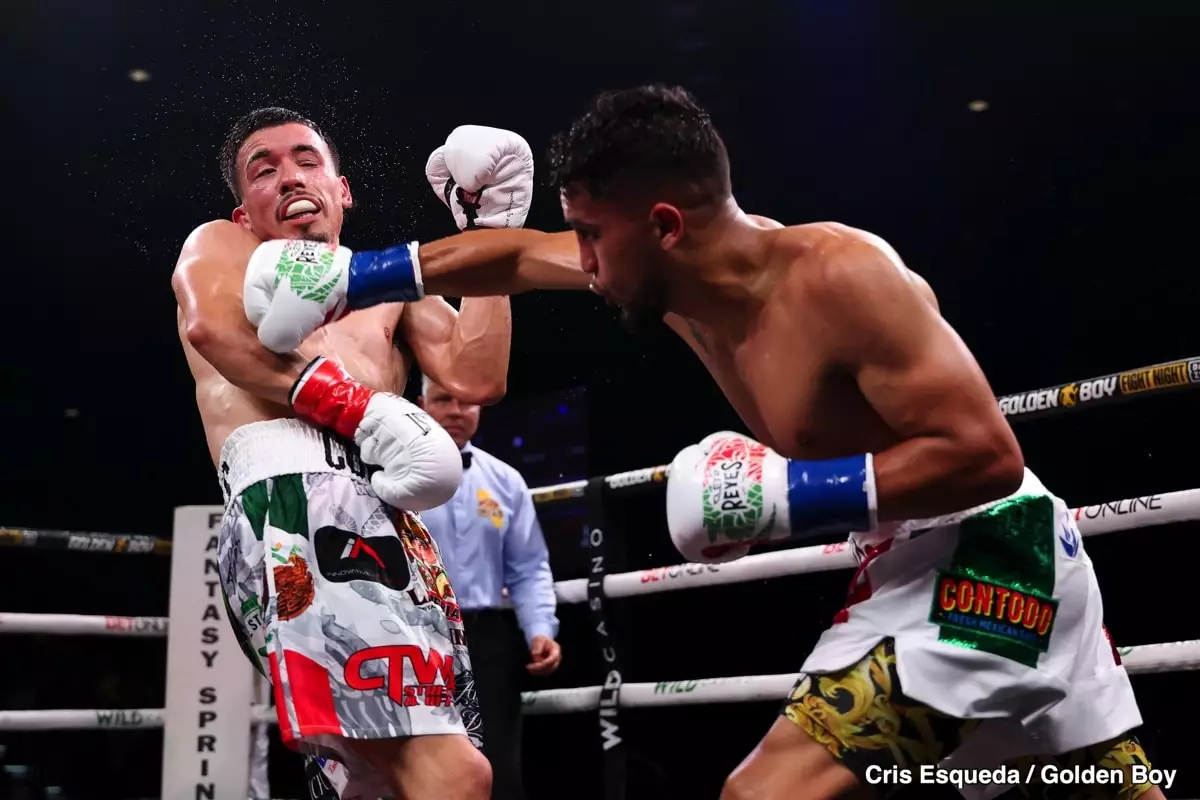In the electrifying environment of Golden Boy’s latest fight night, an unexpected controversy cast a shadow over what could have been a memorable event. Manuel “Gucci Manny” Flores and Jorge Chavez went toe-to-toe across ten grueling rounds, with both fighters showing resilience and skill. Yet, despite their efforts, the outcome was a disappointing draw, revealing more about the deficiencies in judging than about the bout itself. The decision—cards read 93-97, 95-95, 95-95—left many spectators and fighters questioning the objectivity and competence of the officials. Fans expect clarity and fairness, especially in a sport where credibility hinges on impartiality. Instead, they were left pondering: Was this a reflection of poor judging, or a deeper malaise within the sport’s regulatory framework?
Chavez’s reaction was as telling as the scorecards—he was visibly incensed, questioning what the judges had been watching during the fight. His claim that his facial cut was caused by a headbutt and not punches suggests a frustration with consistency and fairness. More alarmingly, Chavez perceived that Flores’s punch power was overrated, implying that the fight was more about showboating than real skill. His bold declaration that he would be ready for Flores next time, or even a different top prospect, highlighted his confidence—and perhaps his frustration, too. Meanwhile, Flores admitted to early respect for Chavez’s elusive style, hinting that a different approach in future bouts might yield a better result. But the core problem remains: without decisive judging, fighters are left to wonder whether their efforts are truly being evaluated with integrity.
This fight underscored a broader issue—judges often appear disconnected from the action, waiting for the end of the bell rather than engaging with the intensity of the bout. Are they distracted, untrained, or simply indifferent? The incident raises questions about accountability and the standardization of scoring criteria. The inconsistency was glaring; a fight that was competitive and hard-fought ended with a result that seemed disconnected from the reality inside the ring. It’s increasingly clear that the current judging system demands overhaul. Fighters deserve credibility, and fans deserve transparency. The frequent occurrence of controversial decisions tarnishes the sport’s reputation and diminishes the heroism of hard-working athletes.
The Co-Main and Undercards: Highlights in a Night Marred by Judgment Flaws
While the main event surrounded controversy, the undercard offered glimpses of promising talent, albeit overshadowed by the night’s judging ambiguities. Jordan Panthen entered the ring with high expectations—someone touted as the flashy, high-power prospect from Hawaii. Instead, he encountered Farid Ngoga from Phoenix, whose strategic boxing style outmaneuvered Panthen, earning a majority decision in a battle that defied expectations. Ngoga’s calm, calculated approach demonstrated that intelligence in boxing often triumphs over raw power. The split decision (with one card a draw) reflected a scrupulous and fair evaluation, a contrast to the main event’s chaos. Ngoga’s victory was a reminder that boxing prowess isn’t solely about punching power but also about clean technique and tactical awareness.
Meanwhile, the night’s other fights showcased emerging talent, some with enough potential to displace the sport’s lingering skepticism. Cayden Griffiths, still in the early stages of his career, showcased his knockout power and precise timing to dispatch David Ramirez in the fourth round, bringing his record to 6-0 with all wins by KO. His explosive finish indicates a future star in the making, though consistency and adaptability are yet to be tested. Leonardo “Bazooka” Sanchez lived up to his nickname, unloading heavy artillery on Abraham Valdez before the referee intervened—another fourth-round stoppage. While such early finishes excite fans, they also throw into sharp relief the importance of proper regulation and quick evaluation to prevent unnecessary damage.
Fabian Guzman provided a more measured victory, winning a unanimous decision over Brian Arregui. This victory was notable not only because of the clean scorecards but also as a symbol of the importance of clear, consistent judging—something lacking in the night’s main event. On the lighter side of the prelims, Bryan Lua and Kevin Piedrahita fought a highly competitive match that ended in a draw, a verdict that some might view as appropriate given the evenly matched contest. As fights like these unfold, it becomes apparent that promising fighters are developing their craft amid a backdrop of inconsistent judging that could either hinder or boost their careers depending on future reforms.
Call for Systemic Change: The Fight Beyond the Ring
This night’s outcomes serve as a glaring wake-up call for the sport’s overseers. Boxing’s credibility relies heavily on transparent and competent officiating, yet too often, decisions—like the controversial main event—muddy the waters of fairness. The problem isn’t just with individual judges but also with the larger structural issues: inadequate training, lack of accountability, and inconsistent scoring rubrics. Unless these systemic flaws are addressed, fighters will continue to operate in an environment where their efforts are judged subjectively or carelessly, eroding trust among fans and athletes alike.
The desire for a rematch or a clearer resolution is natural, but the real solution lies in reforming how judges are selected, trained, and held accountable. Using modern technology, standardized criteria, and rigorous oversight can help ensure decisions reflect the fighters’ performance rather than chance or bias. This experiment in scoring, exemplified by the night’s chaotic main event, demonstrates that crucial improvements are overdue. If boxing is to maintain its integrity and grow as a sport, the focus must shift beyond safety and promotion to include fundamental reforms—chiefly, trustworthy judging that upholds the sport’s honor and ensures that true champions are crowned fairly.

